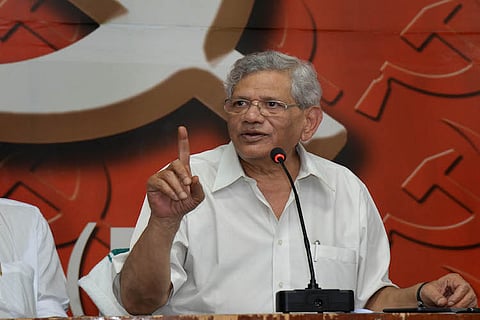

On a day when the Supreme Court of India passed a unanimous verdict to strike down the controversial electoral bond scheme, social media was abuzz with an observation made by advocate Prashant Bhushan to the apex court on October 31, 2023. He said, “Only one party - the CPM which is before this court has consciously refused to take electoral bonds”.
A five-judge Constitution bench of the Supreme Court headed by Chief Justice of India DY Chandrachud, held that electoral bonds are violative of right to information and Article 19(1)(a), which is the right to freedom of speech and expression. The CJI said, “Information about funding of political parties is essential for electoral choices.”
The bench gave its verdict on a bunch of public interest litigations challenging the electoral bond scheme. Among the petitioners, the Communist Party of India (Marxist) was the only mainstream political party to have moved the court challenging the scheme. Dr Jaya Thakur of the Congress party had also filed a petition against the scheme.
Advocate Shadan Farasat, appearing for CPI(M), had argued that the electoral bonds scheme is not meant to reduce black money as claimed by the BJP government but to create an anonymous white channel for money. “The architecture and effect of the electoral bonds scheme is not to reduce black money but to reroute non-anonymous banking channel funding to anonymous electoral bonds. This scheme is an alternative white money channel created by the government…. They've added anonymity to it,” he argued. “There was earlier a black channel. Now you've created an anonymous white channel,” he explained.
Advocate Farasat also argued that this scheme goes against the concept of “informed electorate” under Article 19(1)(a) read with 326 of the Constitution, and also violates the Right to Conscience under Article 25, as individual shareholders don’t get to know about how their money is used.
Welcoming the judgement, CPI(M) general secretary Sitaram Yechury said that he is glad that the Supreme Court bench has upheld the party’s contention. “Congratulations to our Counsel Shadan Farasat and others who effectively argued the case,” he said.
The CPI(M) in February 2018, moved the apex court saying that the Union Government’s decision to introduce an electoral bond scheme ‘undermines democracy’ and that it will ‘lead to greater political corruption’.
Couple of days prior to the landmark verdict, Yechury had put out a video statement likening the scheme to the “legalisation of political corruption” and hoped that the apex court would pass a verdict scrapping the scheme.
Electoral bonds were introduced in 2017 through the Finance Act, which was passed as a money bill without the assent of the Rajya Sabha. The Finance Act amended the Reserve Bank of India Act, Companies Act, Income Tax Act, Representation of Peoples Act, and Foreign Contributions Regulation Act (FCRA), so as to introduce electoral bonds.